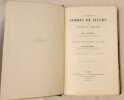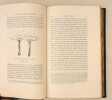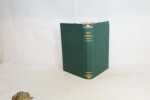-
Type
Book (449)
Magazine (4)
-
Latest
Last 3 days (5)
Last month (5)
Last week (1)
-
Language
English (2)
French (419)
German (1)
Polish (1)
Russian (30)
-
Century
18th (2)
19th (153)
20th (127)
21st (30)
-
Countries
Belgium (19)
Canada (1)
Denmark (91)
France (279)
Germany (3)
Switzerland (28)
United States of America (32)
-
Syndicate
ALAC (1)
CLAM (2)
ILAB (230)
NVVA (5)
SLACES (5)
SLAM (119)
SNCAO (1)
De la fécondation des orchidées par les insectes et des bons résultats du croisement
Paris, C. Reinwald, 1870, in-8, [4]-III-352 pp, 20 pp. de cat. éd, Percaline verte de l'éditeur [A. Lenègre], Première édition française de cet essai sur la co-évolution de la structure sexuelle des orchidées et des insectes qui les fécondent. Cet ouvrage a été conçu par Darwin comme une étude de cas détaillée de sa théorie de l'évolution. La première édition du texte fut publiée le 15 mai 1862. Charles Darwin, qui faisait l'analogie entre les règnes végétal et animal, a consacré aux plantes plusieurs grandes monographies. L'observation du végétal lui a permis de déduire des phénomènes de changement et donc de développer la théorie transformiste. Quelques rousseurs claires, une charnière extérieure légèrement fendillée. Charnière intérieure fragile. Couverture rigide
Bon [4]-III-352 pp., 20 pp. de
De la fécondation des orchidées par les insectes et des bons résultats du croisement
Paris, C. Reinwald & Cie, 1891, in-8, III pp; 352 pp; 34 fig, Percaline verte de l'éditeur, DARWIN, Charles De la fécondation des orchidées par les insectes et des bons résultats du croisement Paris, C. Reinwald, 1870, in-8, [4]-III-352 pp, 20 pp. de cat. éd, Percaline verte de l'éditeur [A. Lenègre]. Première édition française de cet essai sur la co-évolution de la structure sexuelle des orchidées et des insectes qui les fécondent. Cet ouvrage a été conçu par Darwin comme une étude de cas détaillée de sa théorie de l'évolution. La première édition du texte fut publiée le 15 mai 1862. Charles Darwin, qui faisait l'analogie entre les règnes végétal et animal, a consacré aux plantes plusieurs grandes monographies. L'observation du végétal lui a permis de déduire des phénomènes de changement et donc de développer la théorie transformiste. Quelques rousseurs claires, une charnière extérieure légèrement fendillée. Charnière intérieure fragile. (Réf. 94476) / 250.00 ? TTC Couverture rigide
Bon III pp; 352 pp; 34 fig
De la variation des animaux et des plantes sous l'action de la domestication
Paris, C. Reinwald, 1868, in-8, 2 vol, XVI-444-[1] pp, 17 pp. de cat. éd. ; [4]-532-[1] pp, [6] pp. de cat. éd, Percaline verte de l'éditeur [Lenègre], Première édition française, parue la même année que l'édition originale anglaise. Traduction de Jean-Jacques Moulinié (1830-1872) et préface de Carl Vogt. Figures sur bois dans le texte. Darwin applique ici ses théories évolutionnistes aux plantes et animaux domestiques : origines et variations des plantes et animaux domestiques, action de l'hérédité, avantages du croisement, lois de la variation, pangenèse, etc. C'est le plus long ouvrage de synthèse jusqu'alors publié par le naturaliste; Darwin y développe des deux premiers chapitres de l'Origine des espèces et y rapporte un très grand nombre d'observations personnelles. Il utilise par ailleurs sa propre expérience d'éleveur de pigeons, auxquels il consacre tout un chapitre. Accrocs sur les coupes, légers frottements sur les charnières. Rares rousseurs claires. Couverture rigide
Bon 2 vol., XVI-444-[1] pp., 17
De La Variation des animaux et des plantes sous l' action de la domestication. 2 vols. [i.e. French: ""The Variation of Animals and Plants under Domestication""].
Paris, C. Reinwald, 1868 8vo. 2 volumes, both uncut (and volume 2 unopened) in publisher's green embossed full cloth with gilt lettering to spines. Light wear to capitals. Previous owner's name to half titles in both volumes. Light occassional brownspotting throughtout. A fine copy. XVI, 444, (1), 17 pp" (4), 531, (6) pp.
De l'origine des espèces ou des lois du progrès chez les êtres organisés. Traduit en français sur la troisième édition avec l'autorisation de l'auteur par Mlle Clémence-Auguste Royer avec une préface et des notes du traducteur.
Paris Guillaumin et Cie - Victor Masson et Fils 1862 In-12 (h. 18 cm.) lxiv-xxiii-712 pp. une planche dépliante, demi-reliure chagrin brun clair, nerfs, filets dorés. Reliure de l'époque.
Première édition française. Quelques rousseurs, un nom de propriétaire à l'encre rouge sur le faux-titre. Libraire membre du S.L.A.M. (Syndicat national de la Librairie Ancienne et Moderne) et de la L.I.L.A. (Ligue Internationale de la Librairie Ancienne). N'hésitez pas à prendre contact par mail pour des photographies et des détails supplémentaires, pour des recherches ou des estimations de livres anciens et rares.
DE L'ORIGINE DES ESPÈCES par sélection naturelle, ou des lois de transformation des races des êtres organisés. Traduction de Mme Clémence royer avec préface et notes du traducteur
Paris Ernest Flammarion, Editeur, sans date, début XXe 1908 in 12 (18,5x11,5) 1 volume reliure demi chagrin maroquiné marron, dos à nerfs, couverture conservée, L et 650 pages. Reliure de fin du XXe. Charles Robert Darwin, Shrewsbury 1809 - Downe 1882, naturaliste anglais. Traduction de Mme Clémence Royer avec préface et notes du traducteur. Nouvelle édition revue d'après l'édition stéréotype anglaise, avec les additions de l'auteur. Bel exemplaire, bien relié ( Photographies sur demande / We can send pictures of this book on simple request )
Très bon Couverture rigide
Der Ausdruck der Gemüthsbewegung bei den Menschen und den Thieren. Mit 21 Holzschnitten und 7 heliographischen Tafeln. (Übs. v. J. Victor Carus.)
1872 Stuttgart, E. Schweizbart'sche., 1872, 8°, VIII + 384 S., Orig.Leinen, 7 Tafeln heliograv. - Gbrsp., leicht berieben.
Erste deutschsprachige Ausgabe im Jahre der EA.
DES DIFFERENTES FORMES DE FLEURS dans les plantes de la même espèce par Charles Darwin. Ouvrage traduit de l'anglais avec autorisation de l'auteur et annoté par le Dr. Edouard Heckel. Précédé d'une préface analytique du Prof. Coutance. Avec quinze gravures dans le texte.
1878 Paris C. Reinwald et Cie Libraires-Editeurs 1878 Un volume in°8 reliure éditeur pleine percaline verte titres dorés.361 pages plus errata. Avec 15 figures dans le texte. Première édition française.
Très bon état quelques rousseurs éparses N'hésitez pas à nous mettre dans vos favoris. Vous serez ainsi tenu au courant de nos nouveautés
Des différentes formes de fleurs dans les plantes de la même espèce
Paris, C. Reinwald et cie, 1878, in-8, XXXVI-361-[2] pp, 20 pp. de catalogue Reinwald, Percaline verte de l'éditeur, Figures sur bois dans le texte. Première édition française, traduite et annotée par Edouard Heckel, précédée d'une préface analytique par le professeur Coutance. Charles Darwin, qui faisait l'analogie entre les règnes végétal et animal, a consacré aux plantes plusieurs grandes monographies. L'observation du végétal lui a permis de déduire des phénomènes de changement et donc de développer la théorie transformiste. Exemplaire non coupé. Quelques rousseurs. Tache sur la plat inférieur, petits frottements. Couverture rigide
Bon XXXVI-361-[2] pp., 20 pp. de
Des différentes formes de fleurs dans les plantes de la même espèce.
Paris, C. Reinwald et Cie, 1878, 15 X 24 cm., relié, VII-361-20 pages. Traduit de l'anglais avec autorisation de l'auteur et annoté par le docteur Édouard HECKEL. Préface analytique du professeur Amédée COUTANCE. Avec quinze gravures dans le texte. Première édition française. Ex-libris manuscrit de Paul Chastaing, pharmacien en chef de l'Hôpital des Cliniques. Pleine percaline éditeur verte ayant subi quelques frottements. En fin d'ouvrage, 20 pages de catalogue des livres de fonds de l'éditeur. Des rousseurs éparses.
Des Différentes formes de Fleurs dans les Plantes de la même espèce par Ch. Darwin. Ouvrage traduit de l'anglais avec autorisation de l'auteur et annoté par le Dr Edouard Heckel, précédé d'une Préfaec analytique du Prof. Coutance.
Paris, Reinwald et Cie, 1878; grand in-8°, couverture muette d'attente ; XXXVIpp.,361pp.,1f.; rares jaunissures à 3 feuillets, intérieur frais.Illustré de 15 figures dans le texte.
Exemplaire non coupé, dans une couverture d'attente , de la première traduction française. (GrMD)
Des effets de la fécondation croisée et de la fécondation directe dans le règne végétal
Paris, C. Reinwald, 1877, in-8, XV-[2]-496 pp, 20 pp. de cat. éd, Percaline verte de l'éditeur [Lenegre], Première édition française, traduite par Edouard Heckel. Cet ouvrage est le complément de la fécondation des orchidées. Charles Darwin, qui faisait l'analogie entre les règnes végétal et animal, a consacré aux plantes plusieurs grandes monographies. L'observation du végétal lui a permis de déduire des phénomènes de changement et donc de développer la théorie transformiste. Bon exemplaire. Légers frottements, quelques rousseurs claires. Couverture rigide
Bon XV-[2]-496 pp., 20 pp. de
Des effets de la fécondation croisée et de la fécondation directe dans le règne végétal.
Paris, C. Reinwald et Cie, 1877. Grand in-8 de XV (faux-titre, titre, table, avant-propos du traducteur) et 496 pages. In-fine 20 pages du catalogue du libraire. Ouvrage traduit de l'anglais et annoté avec autorisation de l'auteur par le Dr Edouard Heckel, professeur de botanique à la Faculté des Sciences de Grenoble. Première édition de la traduction française. Rousseurs éparses. Pleine percaline verte de l'éditeur, filets à froid sur les plats, dos lisse avec large roulette dorée en tête et en pieds, titre or. A. Lenègre relieur. En bon état, très légères usures aux coiffes.
Les travaux de Darwin sur la biologie de la reproduction ont été un point de départ crucial pour de nombreuses études sur les interactions plantes- pollinisateurs ainsi que sur les systèmes de reproduction. Les études minutieuses menées par le naturaliste sur les relations des végétaux avec leur environnement ont ouvert la porte à de nouvelles disciplines comme l'écologie, la phytogéographie ou la phylogénie. La théorie darwinienne rend intelligible la systématique végétale, lui donne un sens nouveau en dévoilant les relations de parenté existant entre les différents groupes botaniques et en suggérant une histoire évolutive de ces groupes à partir d'un ancêtre commun. L'oeuvre de Darwin a transformé la botanique initialement descriptive en une science évolutionniste.
Des effets de la fécondation croisée et de la fécondation directe dans le Régne Végétal. Ouvrage traduit de l'anglais et annoté avec autorasition de l'auteur par le Dr Edouard Heckel
Paris, C. Reinwald et Cie, 1877 ; grand in-8°,broché, couverture meutte d'attente de papier blanc; XVpp.,496pp.; exemplaire non coupé.
1ère édition française sous couverture muette d'attente.(GrMD)
Des effets de la fécondation croisé et de la fécondation directe dans le règne végétal
Reinwald et Cie Reinwald et Cie, 1977. In-8 relié pleine toile verte éditeur de XV + 496 pages + 20. Le cartonnage est sali avec petit manque sur le haut du plat. Intérieur très correct. En l'état
Toutes les expéditions sont faites en suivi au-dessus de 25 euros. Expédition quotidienne pour les envois simples, suivis, recommandés ou Colissimo.
Deystvie perekrestnogo opyleniya i samoopyleniya v rastitel'nom mire. In Russ...
Short description: In Russian. Darwin, Charles. The effects of cross-pollination and self-pollination in the plant world. Moscow Leningrad: Selkhozgiz, 1939 (Moscow). Deystvie perekrestnogo opyleniya i samoopyleniya v rastitel'nom mire. In Russian /The effects of cross-pollination and self-pollination in the plant world. The image is provided for reference only. It may reflect condition of one of the available copies or only help in identifying the edition. Please feel free to contact us for a detailed description of the copies available. SKU5187887
Die Abstammung des Menschen. Deutsch von Heinrich Schmidt. 11.-15. Tausend.
Leipzig, Alfred kröner, (1908-09). Orig. printed wrappers. VI,154 pp.
Die Enstehung der Arten - Volkausgabe
Alfred Kröner Malicorne sur Sarthe, 72, Pays de la Loire, France 1908 Book condition, Etat : Bon broché In-8 1 vol. - 297 pages
Die Fundamente zur Entstehung der Arten. Zwei in den Jahren 1842 und 1844 verfasste Essays. Herausgegeben von seinem Sohn Francis Darwin. Autorisierte deutsche Übersetzung von Maria Semon.
Leipzig u. Berlin, B.G. Teubner, 1911. Gr.-8°. VIII, 325, (1) S., (6) S. (Anzeigen). Mit 1 Portrait. Orig.-Leinenband.
Mit Exlibris und Blindprägestempel auf dem Vorsatz. Durchgehend mit zahlr. Anstreichungen.
Die geschlechtliche Zuchtwahl. Deutsch von Heinrich Schmidt.
Leipzig, Alfred Kröner, (1909). Orig. printed wrappers. VI,288 pp., textillustr.
(Kröners Volksausgabe).
DOWN HOUSE. THE HOME OF CHARLES DARWIN.
English Heritage, 1998, in-4 broché, 48 pp illustrées. Couverture en bon état, intérieur en très bon état.
EXPRESSION DES EMOTIONS CHEZ LES HOMMES ET LES ANIMAUX -L'-
CHAMPION CLASSIQUES
LIVRE A L’ETAT DE NEUF. EXPEDIE SOUS 3 JOURS OUVRES. NUMERO DE SUIVI COMMUNIQUE AVANT ENVOI, EMBALLAGE RENFORCE. EAN:9782380960266
Gesammelte Werke. Aus dem Englischen übersetzt von J. Victor Carus. Autorisirte deutsche Ausgabe.
Bände 1-12 (von 16) in 9 Bänden. Stuttgart, Schweizerbart'sche Verlagshandlung (E. Koch), 1875-1878. Gross-8°. Mit einem Porträt in Band 2, 6 photographischen Tafeln in Band 7, 3 Karten in Band 11, 6 Karten und Tafeln in Band 12 sowie verschiedenen Holzstichillustrationen im Text. Halbleinwandbände der Zeit mit goldgeprägten Rückentiteln.
Mischexemplar der ersten deutschen Werkausgabe, wie meist ohne die Bände 13 "Das Bewegungsvermögen der Pflanzen" und 14,1 "Die Bildung der Ackererde" sowie der Biographie und den Briefen (Band 14,2 -16). - Wir legen zur Ausgabe: Charles Darwin. Sein Leben, dargestellt in einem autobiographischen Capitel und einer ausgewählten Reihe seiner veröffentlichten Briefe. Herausgegeben von Francis Darwin. Aus dem Englischen übersetzt von J. Victor Carus. Stuttgart 1893. - Arbeitsexemplar von Rudolf Brun und Fred Fischer. - Band 2: Porträt lose, durchgehend mit starken Anstreichungen. Rücken lädiert. Band 5/6 : Rückenkanten angebrochen. Band 7/8: Rückenkanten angeplatzt. Band 7: Mit durchgehenden Anstreichungen und Anmerkungen. Band 11/12: Im Gelenk gelockert. Der beiliegende Biographie-Band mit Bleistiftanstreichungen.
Het Uitdrukken der Gemoedsaandoeningen bij den Mensch en de Dieren. [i.e.: ""The Expression of the Emotions in Man""]. - [FIRST DUTCH TRANSLATION OF DARWIN'S ""THE EXPRESSION OF THE EMOTIONS IN MAN""]
The Hague, Joh. Ykema, 1873. 8vo. In the original publisher's embossed full red cloth with gilt lettering to front board and spine. Previous owner's name to front end-paper and traces after a stamp to lower part of title-page. Spine with a bit of wear, otherwise a fine and clean copy. IX, (1), 435 pp.
The rare first Dutch translation of Darwin's The Expression of the Emotions in Man published the year after the original. The Expression of the Emotions ""is an important member of the evolutionary set, and it was written, in part at least, as a confutation of the idea that the facial muscles of expression in man were a special endowment."" (Freeman p. 142). Darwin concluded that ""the chief expressive actions exhibited by man and by the lower animals are now innate or inherited.""Freeman 1182.
His Pokhodzhennia vydiv cherez pryrodnyi dobir, abo, Zberezhennia spryianykh porid u borotʹbi za zhyttia. (i.e. English: ""Origin of Species) - [FIRST UKRANIAN TRANSLATION OF DARWIN'S 'ORIGIN OF SPECIES']
(Kharkiv), Derzhavne medychne vyd-vo (State Medical Publishing House), 1936. 8vo. In publisher's original grey cloth binding with black lettering to spine with Darwin's portrait embossed on front board. Wear to extremities, corner bumped and light spoling to back board. Inner hinges split and first 3 leaves partly detached. Last 20 ff. slighly creased due to dampstain, otherwise internally a nice and clean copy. 674 pp. + frontispiece, portrait of Darwin and 1 plate with genealogical tree.
The exceedingly rare first Ukranian translation of Darwin's landmark 'Origin of Species'. OCLC only list two copies (Library of Congress and The Huntington Library, USA) Freeman F797.
 Write to the booksellers
Write to the booksellers

















